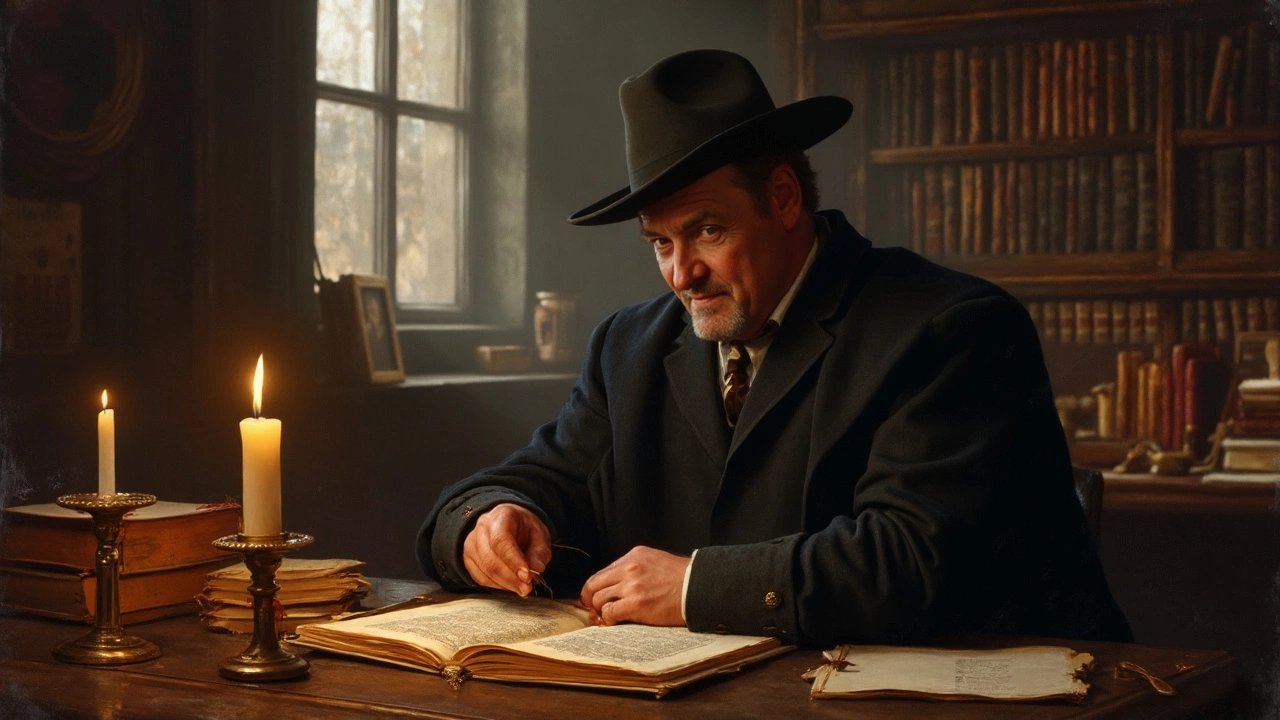Exploring the World of Historical Novels: A Deep Dive into 'Wolf Hall'
 Apr, 14 2025
Apr, 14 2025
Okay, let's cut to the chase. Historical novels are like time machines, without the fancy sci-fi twist, taking you straight into the lives of folks from way back when. We're talking stories set in a particular historical period, bleeding facts and fiction together so well you'd think you're reading a juicy diary rather than modern prose.
Take 'Wolf Hall' by Hilary Mantel as a prime example. Set against the backdrop of Tudor England, it throws you deep into Thomas Cromwell's world, a guy who went from humble beginnings to playing politics with the big shots like Henry VIII. This novel is a master class in how to make the old days feel alive and relatable. So, why should you care about it?
First off, 'Wolf Hall' doesn't just slap some historical context onto a fictional story. It's got its roots dug deep into the reality of the time, backed by heaps of research. You can almost smell the sweat and conspiracy hanging in the air as you flip through the pages. But Mantel doesn't just dump facts on you—she weaves them seamlessly into a narrative that grips like a thriller.
- Understanding Historical Novels
- The Importance of Accurate Settings
- Introducing 'Wolf Hall'
- Character Insights
- Impact and Reception
- Other Notable Historical Novels
Understanding Historical Novels
So, what's the deal with historical novels anyway? Think of them as the ultimate storytelling mash-up. They blend real past events with fictional characters, or sometimes real folks thrown into fictional scenarios. The idea is to transport you back to a specified era so you can soak up the atmosphere, feel the vibes, and understand the struggles of both ordinary and significant historical figures.
A crucial part of historical novels is accuracy. Readers expect authors to have done their homework, making sure the settings, customs, and even language feel authentic. Sure, liberties are taken for the sake of the story, but wildly veering away from historical facts can irk those history buffs who crave authenticity. It's like walking a tightrope between entertaining and informing.
One of the biggest headaches for authors when writing a historical novel is finding that sweet spot between history and fiction. They have to respect actual events and timelines but still craft a gripping story that will captivate you from start to finish. Many authors choose to spotlight lesser-known events or figures to keep things fresh and interesting.
Readers love searching for deeper meanings and connections in these novels. It's not just about the plot—it's about understanding different perspectives and learning from the past. This genre gets you pondering over what-ifs, exploring the human condition through the lens of history.
The Importance of Accurate Settings
Getting the setting right in a historical novel isn't just about painting a pretty picture. It's about dropping you smack-dab in the middle of a specific era and making it believable. When authors nail it, you not only get a sense of the world these characters inhabited, but you feel the dust on your shoes and the tension in the courtrooms.
Take Hilary Mantel's 'Wolf Hall' for instance. It's set in the unpredictable Tudor England during Henry VIII's reign. This wasn't just a time of fancy clothes and royal drama—there was significant social and political upheaval. By anchoring the narrative in real locations, like the sprawling palace of Whitehall or Cromwell's expanding London, the story gains an authentic vibe.
Why is this authenticity so crucial? Well, think about it. If a novel is set against the backdrop of a grand historical event, like the English Reformation, but gets basic facts wrong, it pulls you out of the story faster than you can say "Tudor." Accuracy in setting keeps readers immersed and enhances the credibility of the narrative.
And let's not forget the small details—the clink of metal on armor, the hierarchical murmur echoed in the halls of power. It's these atmospheric bits that make you truly believe you're there, standing right next to Thomas Cromwell as he maneuvers through complex court politics.
Plus, this precision doesn't just satisfy history buffs. It opens a doorway for everyday readers to understand the nuances of the time—how daily life blended with political ambitions, how clothes signified rank, and even how food reflected class differences.
So, when reading 'Wolf Hall' or other top-notch historical novels, it's worth appreciating how much time authors spend nailing down these details. It's not just a backdrop—it's part of why we end up so engrossed in their tales.
Introducing 'Wolf Hall'
Let's dig into why 'Wolf Hall' is such a standout in historical fiction. Hilary Mantel didn't just write a novel; she built a world. This book, first published in 2009, centers on the life of Thomas Cromwell, a key player in Tudor politics. But instead of focusing solely on the well-trodden paths of Henry VIII's reign, Mantel zooms in on Cromwell's rise from obscurity to power. Talk about an underdog story!
This award-winning book, which clinched the 2009 Man Booker Prize, takes you deep into the political maneuvers and personal trials faced by Cromwell. Mantel's portrayal isn’t just about the big historical events you might remember from school, like Henry's marriages or the dissolution of the monasteries. It's also about the nitty-gritty details of Cromwell's life and personality, making him a fully fleshed-out character. It's like you get to walk in his shoes for a bit.
What's really interesting is how Mantel manages to infuse the narrative with authenticity. She spent over five years researching the period, diving into letters, legal documents, and other period sources. This commitment to accuracy ensures that while the book is a work of fiction, it doesn't stray too far from historical facts. Cromwell's strategic mind and his ability to navigate the treacherous waters of court politics come alive through Mantel's words.
Then there's the dialogue and setting. Everything's painted vividly, from the grand palaces to the crowded streets of London. It doesn’t feel like reading a history book; it's more like being a fly on the wall in Cromwell's office, listening in on intense conversations with figures like Cardinal Wolsey or King Henry himself.
The novel's success also led to adaptations that brought 'Wolf Hall' to even wider audiences, including a critically acclaimed TV series. This further cemented its place as a modern classic in the historical novel genre.
If you haven't yet picked up 'Wolf Hall', it's a novel that's definitely worth your time, either for its gripping political drama or its meticulously crafted depiction of 16th-century England. Mantel doesn't just tell you about history; she lets you live it through Cromwell's eyes.

Character Insights
Thomas Cromwell isn't just some historical trivia; he's a fully fleshed-out character in Hilary Mantel's Wolf Hall, making the dusty old chronicles truly come alive. Picture this guy: he started with nothing. Cromwell’s rise from a blacksmith’s son to one of the most powerful men in England is the core of this novel. It's his brain and charm that get him a seat at the power table next to Henry VIII.
What's fascinating about Cromwell in this story is his dual nature. On one hand, he's a man of the people—understanding, compassionate, and a devoted family man. On the other, he's as cunning and politically savvy as they come, maneuvering the complex and often dangerous waters of Tudor politics with finesse. This depth makes him relatable and, dare I say it, kinda likeable despite his flaws.
The supporting cast also adds rich texture. Take Henry VIII, for instance. He's not just the tyrant king we often hear about; in 'Wolf Hall,' he's presented with depth and vulnerability. The book portrays him as a powerful ruler but also a man increasingly desperate for an heir. And then there’s Anne Boleyn, less the scheming temptress and more a complex figure caught in her own ambitions and the king’s gaze.
Mantel’s writing pays close attention to the fine details. She draws from actual letters and historical accounts to make these characters leap off the page. This authenticity ensures readers aren’t just learning history; they’re living it alongside vibrant, flawed humans depicted with empathy and insight.
Impact and Reception
When it comes to making waves, Hilary Mantel's ‘Wolf Hall’ sure knows how to make a splash. This book didn’t just sit quietly on the bookstore shelves; it charged ahead, scooping up awards and praise left, right, and center. It's like the rock star of the historical novel world, and for good reason.
First off, the awards cabinet: the novel snagged the Booker Prize in 2009. Not exactly a small feat, considering it's one of the top accolades you can get in the book biz. Critics praised Mantel's ability to breathe life into Thomas Cromwell with such depth. Her writing made history feel fresh and immediate, which isn't something all historical fiction manages to pull off.
Readers couldn't get enough of it, either. 'Wolf Hall' became a bestseller, with millions of copies sold worldwide. People rave about its richness and the way it transforms dusty history into something vibrant and thrilling. The book didn't just hit the literary highs; it also went on to become a successful stage play and a TV adaptation that dazzled audiences.
Critics often highlight how Mantel’s portrayal of characters, especially Cromwell, flips the script on traditional historical stereotypes. Instead of sticking to the known version of events, she gave them new dimensions, making readers rethink what they thought they knew about Tudor England.
To sum it up, 'Wolf Hall' is a heavyweight in the historical fiction scene. It redefined expectations and proved that diving into history doesn't have to feel like flipping through a dusty textbook. Instead, it can be a pulse-pounding encounter with the past, and Mantel set the bar high for any aspiring historical novelist out there.
Other Notable Historical Novels
Let's talk about other stars in the world of historical novels that have captured readers' imaginations and brought history to life. These books have not only entertained but have also educated people on various historical themes and periods.
One standout is 'The Book Thief' by Markus Zusak. Set in Nazi Germany, this novel takes a unique perspective by using Death as the narrator. Yes, you read that right! It's a poignant tale that follows a young girl named Liesel who finds solace in stealing books and sharing them.
Then there's 'All the Light We Cannot See' by Anthony Doerr, which is also set during World War II. This Pulitzer Prize-winning novel weaves together the stories of a blind French girl and a German soldier whose paths eventually cross. It's a beautiful exploration of human connection amidst the chaos of war.
If American history piques your interest, check out 'The Underground Railroad' by Colson Whitehead. This brilliant novel imagines the Underground Railroad as a literal railroad beneath the ground, providing a unique twist on history.
For fans of the Victorian era, 'Fingersmith' by Sarah Waters offers a gripping mix of crime and drama with a dash of the unexpected. Its detailed depiction of 19th-century England is just as captivating as its twisting plot.
And let's not forget 'A Tale of Two Cities' by Charles Dickens. Okay, technically this one's older, but there's a reason it's considered classic. Dickens dives into the chaos of the French Revolution, spinning a tale of contrasting worlds and personal redemption.
These novels, much like 'Wolf Hall', offer a rich tapestry of visuals and emotions, making history feel alive and relevant. Picking up any of them is like opening a portal to another time, inviting you to sit with its inhabitants and share their joys, struggles, and stories.